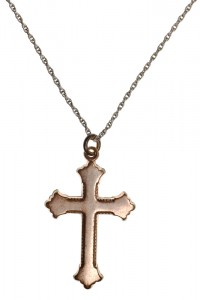 We’re watching developments very closely in Pennsylvania as the state legislature considers an important bill to repeal a 116-year-old discriminatory law that bars public school teachers from wearing religious symbols in the classroom.
We’re watching developments very closely in Pennsylvania as the state legislature considers an important bill to repeal a 116-year-old discriminatory law that bars public school teachers from wearing religious symbols in the classroom.
There’s been a law on the books since 1895 that effectively punishes teachers who exercise their First Amendment rights. Under the law, a public school teacher who wears a cross, yarmulke or other religious symbol in the classroom could be suspended from teaching for one year, and multiple offenses could lead to permanent disqualification. School board members could be held criminally liable for failing to enforce the prohibition.
Thankfully, two members of the Pennsylvania legislature are moving forward with a bill to repeal this dreadful law.
This law is unconstitutional and violates not one, but three, provisions of the First Amendment. In suppressing teacher expression and religious viewpoint, it violates the Free Speech Clause. In specifically singling out religious expression as prohibited, it violates the Free Exercise Clause. Finally, by penalizing the wearing of religious symbols, but not secular ones, it violates the Establishment Clause — which not only prohibits government establishment of religion, but government hostility to religion as well.
In 2003, we successfully defended a teacher’s aide from western Pennsylvania who was disciplined for wearing a cross necklace to school – a school policy that was based on that 1895 law.
In that case, we went to court to protect the constitutional rights of a teacher’s aide in a school district near Pittsburgh. In April 2003, school officials suspended Brenda Nichol without pay for one year for wearing a cross necklace to school. We filed a federal lawsuit on her behalf and asked the court to issue a preliminary injunction. That’s exactly what a federal judge did. And, in granting our request for a preliminary injunction, the judge said Nichol should be reinstated and given back pay because the policy was “openly and overtly averse to religion.”
The court concluded that the school district’s policy displayed “hostility toward religion” and violated the Free Exercise Clause of the First Amendment. The court ordered Nichol to be re-instated to her former position with back pay and benefits pending final disposition of the case at a hearing for a permanent injunction. We then reached a settlement agreement in the case with the school district, which agreed to make the preliminary injunction permanent.
Now, eight years later, Brenda Nichol, who holds the same job and continues to wear her cross, told a reporter she believes the law should be eliminated. “I think it’s important to be able to have freedom of expression,” she said. “In our country, that’s one of the fundamental rights.”
We agree.
Should Pennsylvania repeal its teacher religious garb law, and the indications are strong that it will, then only one state in the country will be left with such a law: Nebraska. In Nebraska, which enacted its law in 1919, it is a misdemeanor for a teacher to wear any “dress or garb” indicating that he or she is a “member or an adherent of any religious order, sect, or denomination.”
It’s only a matter of time before this law is either repealed, like Oregon did with its law last year, or is struck down as unconstitutional by a court.

